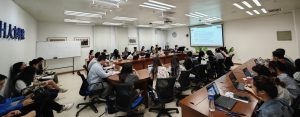The Faculty of Arts and Humanities (FAH) of the University of Macau (UM) recently held the Macao Humanities Forum. The event featured Yang Xiaoshan, department chair in the Department of East Asian Languages and Cultures at the University of Notre Dame and holder of a PhD in comparative literature from Harvard University. Prof Yang delivered a lecture titled ‘The Lure and Peril of Contrarianism: Wang Anshi’s Poems on Wang Zhaojun’. The lecture attracted more than 200 on-site and online participants, including faculty members and students of UM.
At the forum, Joaquim Kuong, assistant dean of FAH, discussed the significance of studying Chinese poetry. Zhang Yue, assistant dean of FAH, highlighted Prof Yang’s academic achievements and his influence on the study of classical Chinese poetry in the Tang and Song dynasties, in particular on the poetry of Wang Anshi. Zhang also introduced Prof Yang’s latest publication.
During the lecture, Prof Yang first presented Wang Anshi’s two poems on ‘Mingfei qu’ (Song of Princess Ming), with a focus on the three most controversial lines. He then discussed the issue about whether these lines blurred the division between the Chinese and the barbarians, and reviewed the evaluations and interpretations by Huang Tingjian, Zhu Bian, Luo Dajing, and other scholars on the lines. Taking into account the context of the poems and the political landscape at that time, he also analysed the criticism of Wang Anshi’s poetry in relation to the political discourse spanning from the late Northern Song dynasty through the early Southern Song dynasty. In addition, Prof Yang discussed the similarities and differences between the matching poems (heshi) and original poems of Ouyang Xiu and Sima Guang in terms of format, theme, and the use of allusion, providing another perspective to understand Wang Anshi’s poetry. He also talked about the commentaries of Zhu Xi and Li Bi, who freed Wang Anshi from political criticism and attributed the controversies to his pursuit of innovation. Prof Yang further explored the controversies arising from Wang Anshi’s two poems. He concluded that the criticism directed at Wang Anshi’s poems stemmed from the attackers’ political and moral biases towards the poet, rather than from any inherent flaws in the poems themselves.
During the Q&A session, Prof Yang engaged in in-depth discussions with UM students and faculty, as well as online participants. He emphasised the importance of maintaining a solid understanding of historical materials and engaging in careful text reading, despite the impact of the digital humanities.
This was the first lecture of the Macao Humanities Forum for the 2023/2024 academic year. The forum, which is held every academic year, aims to provide a platform for world-renowned scholars in different fields of the humanities to share their latest research findings with local teachers and students. The themes of the previous editions have covered a wide range of fields, including literature, linguistics, history, translation, and arts.
|
Source: Faculty of Arts and Humanities |
|
|
Media Contact Information: |
|
|
Communications Office, University of Macau |
|
|
Albee Lei |
Tel: (853) 8822 8004 |
|
Jason Leong |
Tel: (853) 8822 8322 |
|
Email: |
|

